 Image search results - "kashiwabara-juku" Image search results - "kashiwabara-juku" |
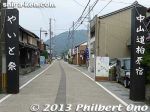
Yaito Matsuri sign
|
|
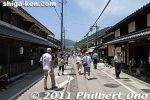
Yaito Matsuri at Kashiwabara-juku, Maibara.
|
|
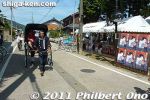
Yaito Matsuri also features rickshaw rides.
|
|
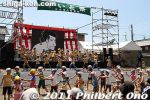
Yaito Matsuri stage entertainment by local kindergarteners.
|
|
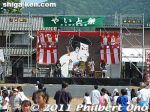
All-girl rock band at Yaito Matsuri.
|
|
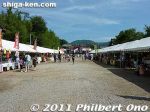
Main venue of Yaito Matsuri next to Ibuki-do, the moxa shop.
|
|
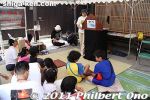
Kami-shibai (picture card) story-telling.
|
|
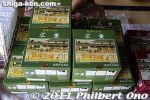
During the Yaito Matsuri, the Ibuki-do has an open house and sells their moxa. 伊吹堂亀屋佐京商店
|
|
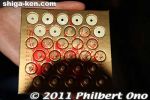
Moxa made by Ibuki-do in Kashiwabara. 伊吹堂亀屋佐京商店
|
|
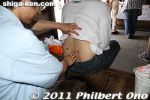
Free moxa cautery treatments at Ibuki-do during Yaito Matsuri, Kashiwabara-juku. You can hardly feel anything. 伊吹堂亀屋佐京商店
|
|
|

Kashiwabara has one long main street called Nakasendo.
|
|
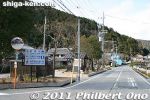
Toward the west end of Kashiwabara is this site called Ochaya Goten, a small palace built for shoguns to rest. 御茶屋御殿跡
|
|
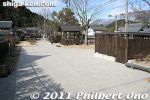
Site of Ochaya Goten, a small palace built for shoguns to rest during the early Edo Period. Tokugawa Ieyasu, Hidetada, and Iemitsu all stayed here. 御茶屋御殿跡
|
|
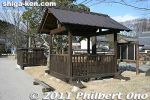
All that remains of Ochaya Goten is this well.
|
|
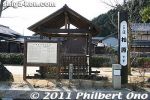
Sign and stone marker indicating the site of the Ochaya Goten in Kashiwabara-juku.
|
|
|
|

About Ochaya Goten. 御茶屋御殿跡
|
|
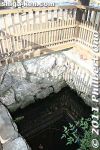
Ochaya Goten well.
|
|
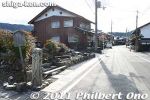
Road markers are commonly found at intersections to tell travelers which way to go.
|
|
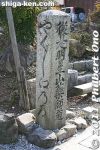
Road marker
|
|

Road marker
|
|
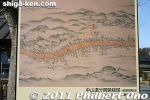
Map of Kashiwabara-juku
|
|
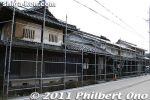
Former Kashiwabara Bank being renovated.
|
|
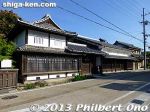
Former Kashiwabara Bank after being renovated. It is now a daytime elderly care center.
|
|
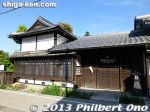
Former Kashiwabara Bank
|
|
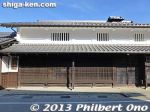
Former Kashiwabara Bank
|
|
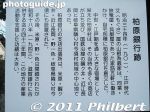
Kashiwabara Bank opened in 1901 by local merchants. There were other branches nearby such as Omi-Nagaoka and Imasu. The bank merged with Shiga Bank and closed in 1943.
|
|
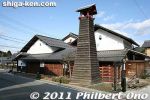
Kashiwabara has been converting its buildings into a traditional look.
|
|

About Kashiwabara Ichirizuka distance marker.
|
|
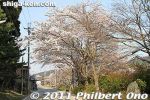
West end of Kashiwabara-juku where there was a West Guard Gate.
|
|

About the West Guard Gate.
|
|
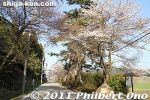
West end of Kashiwabara-juku in spring.
|
|
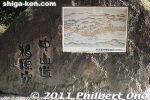
Kashiwabara-juku stone marker.
|
|
|
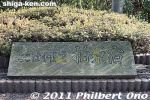
Kashiwabara-juku sign.
|
|
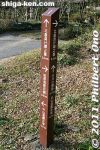
Directions
|
|
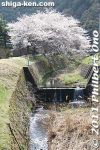
Cherry blossoms and Amanogawa River famous for fireflies in June.
|
|
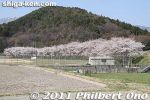
Cherry blossoms next to Kashiwabara Junior High School sports ground.
|
|

Mt. Ibuki as famed haiku poet Basho must have seen it.
|
|
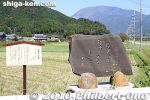
Haiku poem by Basho Matsuo about Mt. Ibuki.
|
|

Way to Kitabatake Tomoyuki-kyo Grave 北畠具行卿墓
|
|
|
|
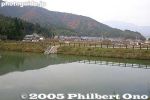
Kiyotaki in the background.
|
|
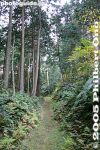
Path to Kitabatake Tomoyuki-kyo Grave
|
|
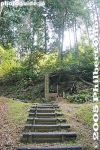
Way to Kitabatake Tomoyuki-kyo Grave
|
|
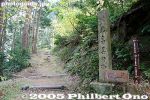
Path to Kitabatake Tomoyuki-kyo Grave
|
|
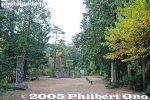
Kitabatake Tomoyuki-kyo Grave 北畠具行卿墓
|
|
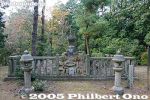
Kitabatake Tomoyuki-kyo Grave. Kitabatake Tomoyuki (1290-1332) was a high-ranking Imperial Court official during the late Kamakura Period. National Historic Site 北畠具行卿墓
|
|

Kitabatake Tomoyuki-kyo Grave 北畠具行卿墓
|
|
|
|
|
|

Way to Tokugen-in temple in Kiyotaki during cherry blossom season in April.
|
|
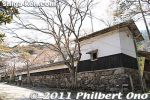
Kiyotaki Tokugen-in temple used to be Kashiwabara Castle. 清滝 徳源院
|
|
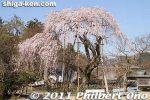
Tokugen-in is famous for two beautiful cherry blossoms trees. This one is a weeping cherry tree.
|
|
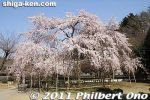
Tokugen-in's other cherry tree.
|
|
|
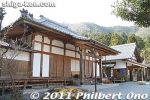
Tokugen-in main hall. 清滝 徳源院
|
|
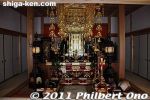
Inside Tokugen-in's main hall.
|
|
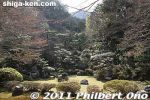
Tokugen-in's garden. Admission 300 yen.
|
|
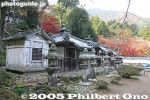
Tokugen-in is also famous for the graves of the Kyogoku Clan.
|
|
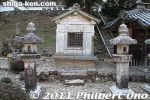
The most famous is Kyogoku Takatsugi. This is his grave.
|
|
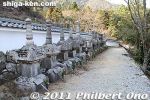
Other Kyogoku Clan graves.
|
|
|
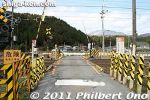
Cross the train tracks to visit another temple.
|
|
|
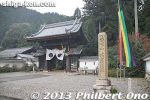
Gate to Jobodai-in temple founded by Saicho in 815. It later became a betsuin temple of Enryakuji temple. 成菩提院
|
|
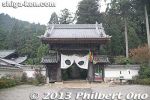
Gate to Jobodai-in temple during open house when we could tour inside the temple.
|
|
|
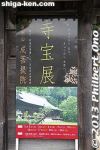
Temple treasure tour is held in autumn in Maibara.
|
|

Jobodai-in temple belongs to the Tendai Buddhist Sect. It was founded in 815 by priest Saicho who built a shack here to lodge while on his way to eastern Japan. The temple's resident priests include many famous ones like Tenkai Daisojo.
|
|
|
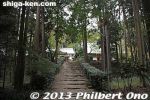
Steps to Jobodai-in temple's main hall in Kashiwabara-juku, Maibara, Shiga.
|
|
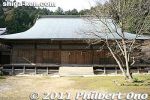
Jobodai-in temple's Hondo main hall. This temple served as lodging for the likes of Oda Nobunaga, Toyotomi Hideyoshi, Azai Nagamasa, and Kobayakawa Hideaki. 成菩提院
|
|
|
|
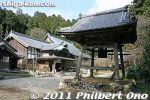
Jobodai-in temple's Bell tower
|
|
|

Jobodai-in temple in its heyday around 1665, it had 64 affiliate temples (末寺) and 109 priests. Oda Nobunaga and Tokugawa Ieysau even donated land to the temple.
|
|
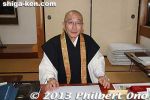
Priest of Jobodai-in temple who conducted tours inside the temple during the open house.
|
|
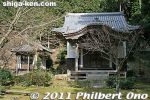
Jobodai-in temple
|
|
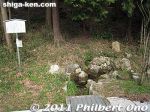
Water spring called Shirashozu. 白清水
|
|
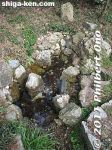
Shirashozu. Note that this water has not been certified for safe drinking. 白清水
|
|
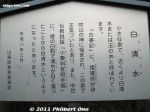
About Shirashozu. This might be the spring where Yamato Takeru healed himself after being poisoned by the evil god on Mt. Ibuki. 白清水
|
|
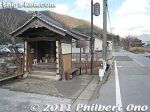
Terutehime-kasa Jizo
|
|

Terutehime-kasa Jizo 照手姫笠地蔵
|
|
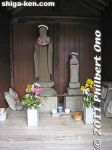
Terutehime-kasa Jizo is the smaller statue on the right. 照手姫笠地蔵
|
|
|
|
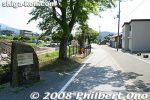
East end of Kashiwabara-juku.
|
|

Kashiwabara-juku stone marker.
|
|
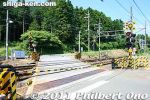
Cross the train tracks here on the east end of Kashiwabara.
|
|
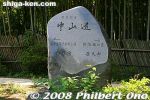
Large stone marker pointing the way to Kashiwabara and a neighboring village.
|
|
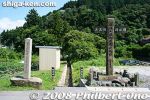
Nemonogatari-no-Sato is where the prefectural boundary between Gifu (Imasu) and Shiga is located. The inns are no longer here, but guests at both inns used to talk to each other across the border before sleeping.
|
|
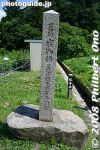
Gifu side.
|
|
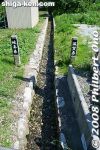
Prefectural boundary between Gifu (Imasu) and Shiga (Kashiwabara) is this narrow groove. The cross-border bedtime chatter in the old days gave this place the name Nemonogatari-no-Sato.
|
|
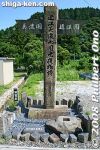
Shiga side
|
|
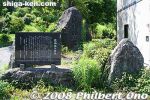
Nemonogatari-no-Sato (Bedtime Story Town) momument. 寝物語の里
|
|
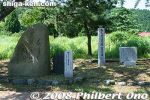
Basho haiku monument
|
|
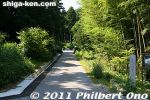
Entrance to Takekurabe Castle on a mountain. 長比
|
|
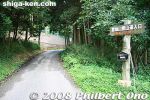
Hiking path to Mt. Ryosen. Best not to hike alone.
|
|
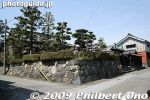
In Tarui in Gifu, the building which served as Kashiwabara's Honjin still exists.
|
|
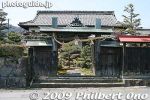
Kashiwabara-juku's Honjin in Tarui, Gifu. The former Honjin served as the Nangu Shrine priest's residence.
|
|
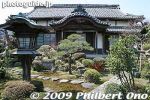
Kashiwabara-juku's Honjin in Tarui, Gifu. During the Meiji Period while still in Kashiwabara, the former Honjin was used as a primary school before it was moved to Tarui.
|
|

The Honjin was where VIPs such as daimyo lodged.
|
|
|
|
|
|
|
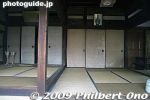
Inside Kashiwabara-juku's former Honjin in Tarui, Gifu. On the left is the Jodan-no-Ma where the daimyo lord stayed.
|
|
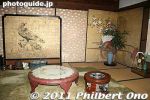
Inside Kashiwabara-juku's former Honjin in Tarui, Gifu.
|
|
|
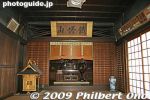
Inside Kashiwabara-juku's former Honjin in Tarui, Gifu.
|
|
|
|
|
|
|